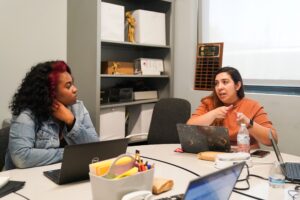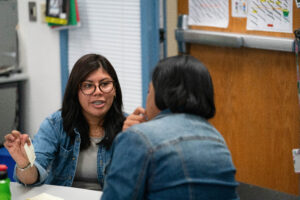We’ve been reflecting on our report The Irreplaceables and the real retention crisis: the failure of schools to keep their best teachers from walking out the door while permitting struggling teachers to remain indefinitely. As Tim noted, progress overall has been incremental, but a few districts and charter school networks are taking on this challenge in big ways.
We wanted to find out what KIPP, the country’s largest and most acclaimed charter school network, is doing to keep its Irreplaceables. So we spoke with Jen Keyte, Instructional Director at KIPP’s Teaching and Learning Labs, about the network’s recognition and retention efforts.
KIPP took a smart approach to the question: it got its top teachers involved early. Thirteen high-performing veteran teachers gathered for a Design Thinking workshop in late 2012, entitled “How do we keep great teachers teaching?” and attended by lead Irreplaceables researcher Melissa Wu.
“Teacher sustainability is a concern we’ve heard over the years, both from teachers and our leaders,” Jen told us. “I expected the conversation to be about feeling tired and not getting paid enough. But it wasn’t. The teachers all talked about wanting to grow and develop from within the classroom, wanting to be recognized in ways that are aligned to our values and wanting some flexibility in their professional lives that wouldn’t sacrifice outcomes for kids.”
She went on to explain that the conversation helped KIPP understand more clearly the challenges it was facing and where it was on the right track. Here’s what she told us:
“In general, they identified three major concerns and pointed to good things KIPP is doing to address them, so we can think of ways to do better:
- How do we satisfy the need for teachers to advance without having to leave the classroom? Teachers want to develop in their careers, but a lot of the time, that means stopping teaching. We want to make a big deal of folks being effective teachers. For example, we have selected highly effective teachers to be “featured” teachers, and that group is leading designing new curricula for the entire network, to be aligned to the Common Core. We honor them, give them a stipend, and they get some special development and the opportunity to collaborate with highly effective colleagues. That will extend into a curriculum fellowship we’re running next year.
- How do we provide teachers with more flexibility and time without sacrificing outcomes for kids? Our students need a lot. They need a lot of our time, and they demand a lot of our teachers. But teachers need to pick up their dry cleaning and get their cars fixed. Balancing a demanding work environment with a personal life is a challenge for our teachers, many of whom come to us when they are young, and feel stretched as they grow older and have kids. Some of our schools offer two salary tracks: a higher track associated with longer hours, and a more traditional track, associated with a more traditional teaching schedule. Others try to chip away at this issue in small ways, such as giving teachers one late-start morning or early-dismissal afternoon each week. These small things are highly valued.
- How do we provide teachers with meaningful recognition? This was what surprised me most: little things mean a lot. We spoke with someone from Pixar, which has asked how to keep engineers engineering over the long term. They give every engineer who has been there for 10 years a bronze Buzz Lightyear statue—which blew our teachers’ minds. They just couldn’t get over it, a tangible recognition that is small, but really cool. They also talked about how, at our annual summit, which brings together everyone at KIPP, we have a gala on the last night and Dave and Mike have all the teachers stand based on how long they’ve been teaching. Those who teach the longest stand the longest and get the most applause. It’s now a tradition that our teachers told us means a lot to them.”
What were Jen’s conclusions from the session? “My takeaway was that while we have made some pretty significant progress, in that KIPP is definitely changing for kids, there’s way more we could be doing for our teachers. And it doesn’t have to be very complicated or difficult.
Our teachers love working at KIPP because they love their colleagues, and they love working with a group of like-minded people who share the same belief that all of our kids will learn. And while there are big things we need to work on around work demands and compensation, small steps and being intentional about recognition are really important but just not that hard. These are things we can do in our schools right now that will go a long way.
Overall, the reaction was ‘thank you for finally paying attention to this.’ They were clear that this was a necessary conversation and one they wanted to have.”
The challenge of moving from ideas to implementation is considerable for such a large network, and it’s important to note that KIPP is at the beginning of this work at the national level. Individual networks, such as KIPP Metro Atlanta, are devising ways to promote smart retention. During the one-day summit, teachers also started work on a potential five-step career path that would offer different opportunities for development and recognition.
We’ve seen smaller charter networks also focused on their Irreplaceables shifting to implementation this past year, including YES Prep and Foundation Academies—which we’ll say more about in this space soon. At KIPP and elsewhere, we’ll be excited to see what comes next.
June 27: This post has been updated to specify that some KIPP schools offer two salary tracks.







